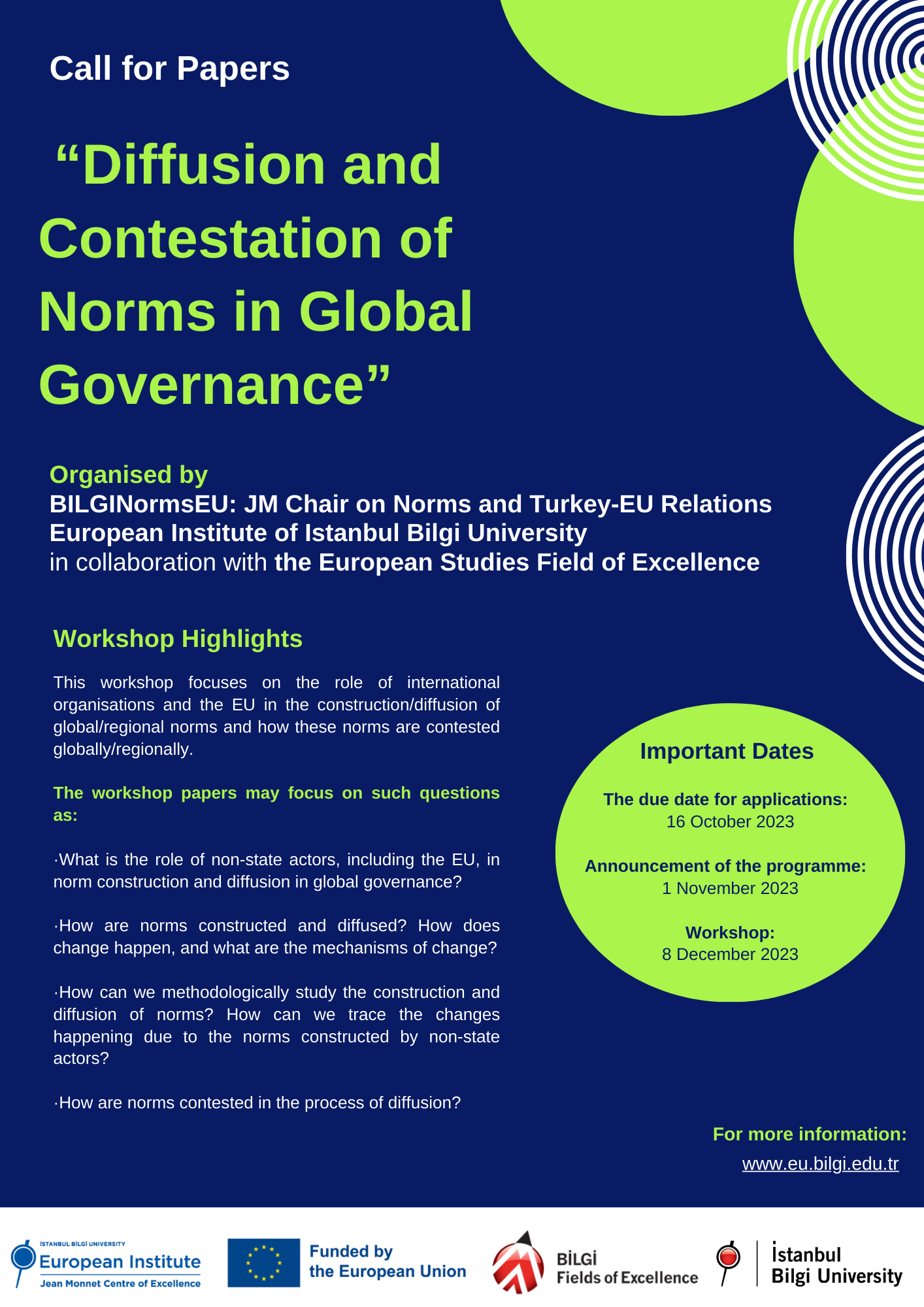Workshop on Diffusion and Contestation of Norms in Global Governance
organised by
BILGINormsEU: JM Chair on Norms and Turkey-EU Relations
European Institute of Istanbul Bilgi University
in collaboration with the European Studies Field of Excellence
This workshop focuses on the role of international organisations and the EU in the construction/diffusion of global/regional norms and how these norms are contested globally/regionally.
Within the framework of European studies, norm construction/diffusion was focused upon extensively in terms of the Europeanisation literature (see Radaelli, 2003). The process of Europeanisation is an example of an institutionalised form of regional norm diffusion. The EU’s sui generis nature also gives a unique power to it in the global arena: the construction of norms and the transfer of these norms. The Green Deal launched in 2019 is a vital example of this norm construction.
The scholarly works on Europeanisation initially emphasised norm diffusion with pressure, which occurs through the instrument of conditionality in the form of a top-down process (see Grabbe, 2003). However, the latter literature has indicated that norm diffusion is more complex and dynamic than in the initial Europeanisation accounts (Bulmer & Radaelli, 2004). Diffusion happens horizontally and vertically, from the EU to the national level, from the national level to the EU level, from the national level to other national levels, and from the national to the societal level.
This workshop aims to shed light on this complexity by discussing the different mechanisms through which norms are constructed/diffused and contested by focusing on 1) how change occurs as a result of global/regional norms, particularly in policy areas where there is no direct pressure for change, and also 2) how norms are translated/reconstructed/deconstructed and contested in the process of change. In studying norms and diffusion of norms, we focus on three issues: identifying the global/regional norm in question, tracing their diffusion routes/mechanisms, and locating the actors/agents of the process (see Jacobs, 2015). 3) how norms are contested: actors, strategies and frames of contestation. The mere existence of a norm is not sufficient for change to happen. It is also essential for decision-makers to be aware of a particular norm, and norms, without a doubt, will always be contested in the process.
The workshop also scrutinises the relationship between de-Europeanisation and norm contestation. In polycrisis times, the political dynamics of the multiple and overlapping crises draw potential of current literature on norm contestation (Speyer & Stockmann, 2023; Wiener, 2018) in analysing how a norm is contested (e.g., gender equality, the rule of law, an environmental norm or norms in migration) by the EU and within the wider Europe. Norm contestation has institutional and discursive aspects and is intertwined with processes of de-Europeanisation.
Another tension to be scrutinised in this workshop is the conceptions of the EU as a normative and civilian power. As this dual identity interacts with the fault line between supranationalism and intergovernmentalism, the power relations in the EU affect its identity through some policy areas, such as the refugee crisis. In the face of the influx of refugees, the European Neighborhood Policy is struggling to balance the EU’s normative claims on the one hand and the security and geoeconomic concerns on the other (Manners, 2006; Bachmann, 2013). The resulting policy responses and agreements have been at odds with the EU’s normative aspirations, raising questions about the coherence of its normative power.
This workshop adopts an interdisciplinary perspective on norms diffusion and contestation. It aims to bring the non-state actors of world politics to the centre stage by discussing their role in shaping global governance. The workshop papers may focus on such questions as:
- What is the role of non-state actors, including the EU, in norm construction and diffusion in global governance?
- How are norms constructed and diffused? How does change happen, and what are the mechanisms of change?
- How can we methodologically study the construction and diffusion of norms? How can we trace the changes happening due to the norms constructed by non-state actors?
- How are norms contested in the process of diffusion?
References:
Bachmann, V. (2013). The EU's civilian/power dilemma. Comparative European Politics, 1(4), 458–480. https://doi.org/10.1057/cep.2012.25.
Bulmer, S. J. & Radaelli, C. M. (2004). The Europeanisation of national policy? (No. p0042). Queens University Belfast.
Grabbe, H. (2003). Europeanisation Goes East: Power and Uncertainty in the EU Accession Process. In K. Featherstone & C. M. Radaelli (Eds.), The Politics of Europeanization. Oxford University Press.
Jacobs, A. M. (2015). Process tracing the effects of ideas. In A. Bennett & J. T. Checkel (Eds.), Process tracing: From metaphor to analytic tool. Cambridge University Press.
Manners, I. (2006). European Union ‘Normative Power’ and the Security Challenge. European Security, 15(4), 405–21. https://doi.org/10.1080/09662830701305880.
Radaelli, C. M. (2003). The Europeanization of Public Policy. In K. Featherstone & C. M. Radaelli (Eds.), The Politics of Europeanization. Oxford University Press.
Speyer, J & Stockmann, N. (2023). How a Conversation Between EU Studies and Critical-Constructivist IR Norm Research Illuminates a Union in Crisis: A Research Note. JCMS: Journal of Common Market Studies, https://doi.org/10.1111/jcms.13508.
Wiener, A. (2018). Contestation and Constitution of Norms in Global International Relations. Cambridge University Press.
Paper proposals
Please send your paper abstract and a short bio to the European Institute (europe@bilgi.edu.tr)
Please submit your application as a single PDF file.
Paper proposals should include the following:
- Abstracts of 500 words
- Short bios of 200 words
Important Dates
The due date for applications: 16 October 2023
Announcement of the programme: 1 November 2023
Workshop: 8 December 2023
The Organizing Committee
- Prof. Ayhan Kaya, Department of International Relations
- Prof. Ayşe Uyduranoğlu, Department of Economics
- Assoc. Prof. Kerem Cem Sanlı, Department of Law
- Faculty Member, Özge Onursal Beşgül, PhD Department of International Relations
- Faculty Member, Mehmet Ali Tuğtan, PhD Department of International Relations
- Faculty Member, Büke Boşnak, PhD Department of International Relations
- Faculty Member, Pınar Artıran, PhD Department of Law
- Faculty Member, Ali Alper Akyüz, PhD Department of Arts and Cultural Management


